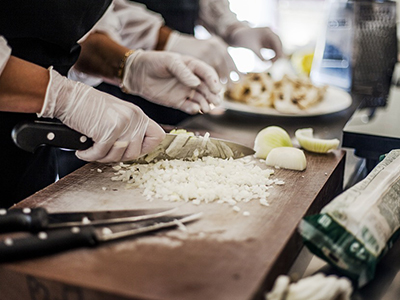“Food, in the end, in our own tradition, is something holy.
It’s not just about nutrients and calories.
It’s about sharing. It’s about caring.
It’s about honesty. It’s about identity.” - Louise Fresco
The new decade has barely started and the world seems to be grappling with the worst pandemic in modern history. While we are all doing our part by staying at home to flatten the curve and utilising our free time to take up a new hobby, read books or binge-watch series, or simply catch up on sleep, many small businesses are facing the heat during lockdown. The hospitality industry is one such sector that is facing losses and uncertainty on a monumental scale. With social distancing becoming the new norm, the food and beverages industry is left in a lurch as there is no natural cushioning in the food service sector. This raises a very important question ‘How to Keep the Catering Industry Afloat during the Covid-19 Lockdown?’
With the nation-wide shutdown, all variable and some semi-variable costs such as costs of goods, electricity, water and gas, have all stopped or gone down significantly. However there are fixed expenses like rent, GST, and man-power cost that need to be considered. After analysing the current scenario and also considering how the next half of the year might proceed, we at Soul Chef came up with certain steps or tips that can help catering businesses cut down their losses and sail through this lockdown.
1. Join a community
The first thing we all need to realise and accept is that although this is an unexpected and unprecedented event, we are all in this together. Yes, healthy competition helps businesses to grow, but so does working together. And this is one such example where we need to come together as a community to help each other. Join an existing virtual community or create a new virtual community where you can talk out the existing problems faced by all and have open discussions regarding how to handle the situation. This will also help to set new rules or guidelines that everyone has to follow once this crisis is over.

2. Make a difference
We must not forget that we are in the hospitality sector, in the food service business. And that means, somewhere, we have a moral obligation to do what we can to help in this time of need. If doing it alone seems daunting or difficult, two or three small local businesses can come together to create a rotating menu of your specials, prepare food packages, organise bags of fresh fruits and vegetables, and get them delivered to those who need it. It can be done both as part of a business effort by responding to online orders as well as helping the needy from going hungry. We, at Soul Chef, believe that serving food is our duty. So it is alright that right now we may not be functioning for commercial purposes, this small effort will go a long way in creating a social bond with the local community and also help us stay grounded by contributing our services for this effort. At the same time, we can also use this opportunity to create a food takeaway service that will bring in some revenue. Even if we cannot connect with people the way we normally do, we can still help nourish them in a different way.
3. Welcome the change and adapt to the new situation
The current health scare has brought about many new changes and habits that we may have to follow for quite some time. And it is advisable to adapt to this changing culture. Food safety and hygiene will have much more prominence than it does now; and although that is something Soul Chef has always prioritised, this is something that is of utmost importance now for everyone in the industry. Similarly, there may be changes in how food is prepared and served as well. Try to make the transition smooth for your employees as well as your future guests.

4. Stay in contact with your clients, guests and employees
Create a virtual platform where you can stay in touch with your clients. Take this time to hear out their suggestions or concerns and use them to develop your business. This will help you to come back with better services. Also make sure to stay connected with your employees. Assure them regarding their jobs, so that they can come back with a renewed vigour. Soul Chef has made an employee group to stay in contact with our staff and enable open communication.
5. Reschedule bookings
Do not cancel your bookings. Reassure your clients regarding the event and your services. Reschedule the bookings after proper discussions with your clients and do not accept any extra charges for this. You can utilise this time to plan for the upcoming months, come up with some new recipes or revamped menu. This will also allow your clients to make modifications to their bookings if needed. After all, the hospitality industry is all about providing the best service.

6. Create a plan for the upcoming season
This is just a temporary situation and everything will be back on track soon. You can take out this time to work on your long-term goals and plan ahead. Analyse the market trends and plan accordingly keeping the rising prices in mind. With this free time while you are at home, work on enhancing your services.
Lastly, we can hope that since people are cooking at home, and having ‘first-hand experience of the time and effort it takes to cook a dish’, this may translate to a new-found respect for the catering business, for those who work hard behind the scenes to bring a smile to people’s faces.
Latest Blogs
- Make your Special Occasion a Memorable Experience - Soul Chef
- Five Tips To Plan A Successful Corporate Event
- Catering Ideas For An Awesome Birthday Party
- Pranayama - The Power Of Yoga Breathing
- Boost Your Immunity with Hasta Mudra
- Five Strategies To Improve Food Safety In Catering Services
- How To Keep The Catering Industry Afloat During The Covid-19 Lockdown?
- Best Food Safety And Hygiene Practices For Buffets And Events

